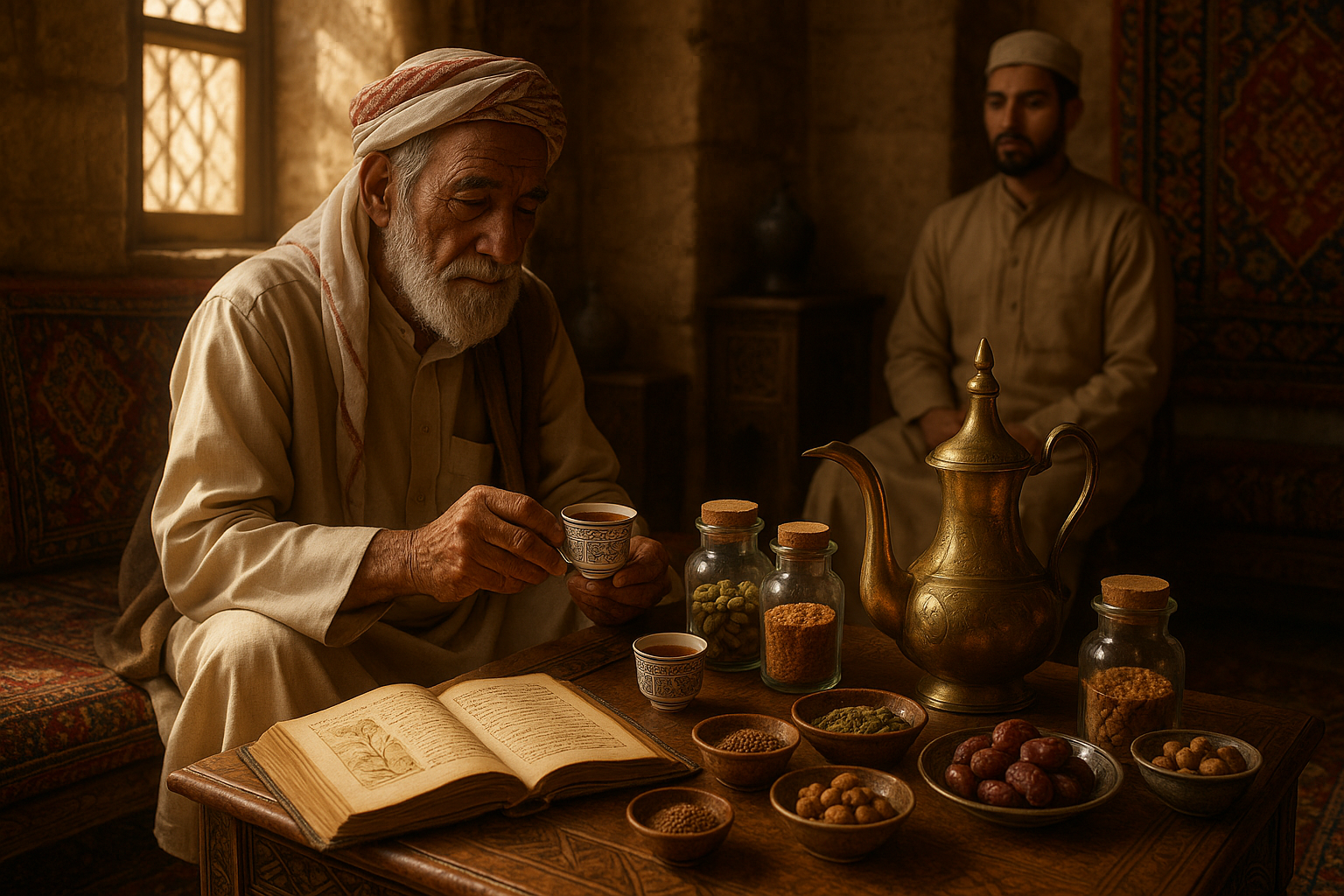In the heart of bustling bazaars and under the warm glow of ancient lanterns, a story brews that is as rich and complex as the drink itself. Coffee, often hailed as the lifeblood of modern society, has a history deeply intertwined with the cultures of the Middle East. But beyond the aromatic allure and social camaraderie it fosters, coffee has played an intriguing role in the realm of traditional Middle Eastern medicine. ☕️✨
Long before it became the world’s favorite morning ritual, coffee was celebrated for its healing properties and was an integral part of medicinal practices in Middle Eastern cultures. The journey of coffee from a simple bean to a cherished healing brew is a tale steeped in mystery, ancient wisdom, and cultural significance. This article embarks on a fascinating exploration of the ancient secrets of coffee and its place in Middle Eastern medicine, uncovering how this beloved beverage was used not just for its energizing effects, but also for its therapeutic benefits.
As we delve into the pages of history, we’ll discover how coffee, or “qahwa” as it is known in Arabic, transcended its role as a mere drink. It became a symbol of hospitality, a focal point in social gatherings, and a valuable ingredient in the healing arts. From the mystic Sufi orders who drank it to stay awake during long nights of devotion, to the traditional healers who prescribed it for various ailments, coffee’s journey is as captivating as the lands from which it originates.
In this article, we will uncover the origins of coffee in the Middle East and its rise as a cornerstone of traditional medicine. We’ll explore the ancient manuscripts and medical texts that highlight coffee’s use in treating a plethora of conditions, from digestive issues to mood disorders. You’ll learn about the pioneering physicians and scholars who documented these practices, offering insights into the holistic approaches of the time.
Next, we will delve into the science behind the healing powers attributed to coffee. Modern research has begun to validate some of the ancient beliefs, shedding light on the compounds within coffee that contribute to its health benefits. From antioxidants to anti-inflammatory properties, we will examine how these elements align with the traditional uses documented centuries ago.
The cultural significance of coffee in Middle Eastern societies cannot be understated. As we journey through this narrative, we will also explore how coffeehouses, or “qahveh khaneh,” became centers of social interaction, intellectual discourse, and even political movements. These establishments were more than just places to enjoy a cup of coffee; they were vibrant hubs of cultural and medical exchange.
Furthermore, we will touch upon the rituals and ceremonies surrounding coffee consumption in the Middle East. These practices are imbued with symbolism and respect, reflecting the deep reverence for coffee as both a beverage and a medicine. By understanding these customs, we gain a richer appreciation of how coffee has been woven into the fabric of everyday life and health.
Throughout this article, we will hear from experts and historians who will provide additional perspectives on the enduring legacy of coffee in Middle Eastern medicine. Their insights will help us connect the past with the present, illustrating how ancient practices continue to influence modern approaches to health and wellness.
So, prepare to embark on this aromatic journey through time, where the ancient secrets of coffee in Middle Eastern medicine await to be revealed. Whether you’re a coffee aficionado, a history enthusiast, or someone interested in holistic health, this exploration promises to enrich your understanding and perhaps even transform your relationship with that cherished cup of coffee.
# The Healing Brew: Uncovering the Ancient Secrets of Coffee in Middle Eastern Medicine
Coffee, a staple beverage across the globe, has a history as rich and deep as its flavor. While today it’s commonly associated with waking up and staying alert, its origins in Middle Eastern medicine are filled with intrigue and ancient wisdom. This article dives into the lesser-known medicinal uses of coffee from ancient times, exploring its profound impact on health and wellness.
## The Origins of Coffee: A Journey Through Time
The journey of coffee begins in the Ethiopian highlands where the coffee plant, Coffea arabica, was first discovered. Legend has it that a goat herder named Kaldi noticed his goats becoming particularly energetic after eating berries from a certain tree. Curious, Kaldi tried the berries himself and soon experienced the same invigorating effects. These tales of energizing berries reached the ears of monks who began using the berries to stay awake during long hours of prayer.
From Ethiopia, coffee made its way to the Arabian Peninsula, where it became an integral part of Middle Eastern culture. The Sufi monasteries of Yemen were among the first to cultivate coffee, brewing the beans into a drink that helped them endure long nights of devotion. Known as ‘qahwa’ in Arabic, coffee quickly spread throughout the Islamic world and became a fixture in social and religious life.
What sets this narrative apart is not just the cultural significance of coffee but its medicinal value as perceived in ancient Middle Eastern practices. Coffeehouses became hubs of intellectual exchange, often referred to as ‘schools of the wise’, reflecting the coffee culture’s deep integration into societal learning and health.
## Coffee as Medicine: The Ancient Beliefs and Practices
The medicinal applications of coffee in the Middle East were documented by early scholars and physicians. Coffee was praised for its ability to energize the body and sharpen the mind. According to Avicenna, a Persian polymath who made significant contributions to various sciences, coffee was an “antidote to lethargy” and a powerful digestive aid.
Ancient Middle Eastern medicine, which was heavily influenced by Greek and Roman traditions, often focused on balancing the body’s humors. Coffee was believed to have a warming and drying nature, making it particularly useful in balancing excess moisture in the body. It was commonly prescribed for ailments such as headaches, flu, and colds, serving as an early form of what we now recognize as holistic medicine.
The 16th-century physician and botanist Ibn al-Baitar recorded coffee as beneficial for “strengthening the stomach” and “clearing the liver.” These early observations are now supported by modern studies showing coffee’s positive effects on liver health and its role in reducing the risk of certain liver diseases.
## The Alchemy of Coffee: Understanding its Components and Effects
To appreciate coffee’s ancient medicinal uses, it’s essential to understand its chemical composition. Coffee contains several bioactive compounds that contribute to its health benefits. Caffeine, the most well-known component, acts as a central nervous system stimulant, improving focus and reducing fatigue. However, coffee’s health benefits extend beyond just caffeine.
Polyphenols, particularly chlorogenic acids, are potent antioxidants found in coffee. These compounds help combat oxidative stress in the body, reducing inflammation and potentially lowering the risk of chronic diseases. Other constituents, such as diterpenes (cafestol and kahweol), have been studied for their anti-inflammatory and hepatoprotective effects, further cementing coffee’s role in traditional medicine.
Modern science continues to unveil the complex chemistry of coffee and its diverse impacts on human health. The table below illustrates a comparison of the key compounds in coffee and their associated health benefits:
| Compound | Health Benefits |
|---|---|
| Caffeine | Improves mental alertness, enhances physical performance, reduces fatigue |
| Chlorogenic Acids | Antioxidant, anti-inflammatory, may help in glucose regulation |
| Diterpenes (Cafestol, Kahweol) | Liver protection, anti-inflammatory, potentially anti-carcinogenic |
## The Social and Spiritual Dimensions of Coffee in Middle Eastern Culture
Coffee has always been more than just a drink; it is a social ritual and a spiritual connector in the Middle East. The ritualistic preparation and consumption of coffee are steeped in tradition, from the meticulous roasting process to the communal sharing in coffeehouses. These practices were not only about enjoying the beverage but also about fostering community bonds and spiritual contemplation.
Coffeehouses, or ‘qahveh khaneh’, became centers of social interaction, intellectual discourse, and entertainment. They played a crucial role in the dissemination of information and ideas, much like the salons of Enlightenment Europe. These establishments were pivotal in the cultural and political life of the Middle East, offering a space where individuals from all walks of life could gather.
The spiritual dimension of coffee consumption is evident in Sufi traditions, where the beverage was used to aid in religious rituals and meditation. The heightened awareness brought on by coffee was believed to facilitate deeper spiritual experiences, aligning the drink with the pursuit of divine wisdom. This intersection of the sacred and the mundane illustrates the profound impact coffee has had on Middle Eastern society.
## Modern Reflections: The Legacy of Coffee in Health and Wellness
In contemporary times, the legacy of coffee as a medicinal and cultural phenomenon continues to thrive. While many of the ancient beliefs about coffee’s health benefits have been confirmed by modern science, the beverage’s cultural significance remains undiminished. Today, coffee is celebrated not only for its energizing properties but also for its role in health and wellness.
Scientific studies have expanded our understanding of coffee’s health effects, linking moderate consumption to reduced risks of several diseases, including Parkinson’s, Alzheimer’s, and certain types of cancer. The antioxidant properties of coffee are recognized for their ability to protect against cellular damage, reinforcing the beverage’s status as a health-promoting elixir.
As we look back at the ancient wisdom surrounding coffee, we gain a deeper appreciation for its enduring legacy. The Middle Eastern tradition of coffee as medicine serves as a testament to the intricate relationship between culture, health, and well-being. For those curious about the modern implications of coffee on health, the video below offers an engaging exploration of coffee’s benefits in today’s world:
The Science Behind Coffee’s Health Benefits – Channel: Health Unplugged ☕✨
## Embracing Coffee’s Rich Heritage in Modern Practices
Incorporating the age-old wisdom of coffee into modern health practices involves a holistic approach that considers both its medicinal properties and cultural significance. Embracing this rich heritage requires an understanding of how ancient practices can inform contemporary lifestyles.
For those interested in exploring coffee’s traditional uses, consider integrating some of these practices into your routine:
- Enjoying coffee in a social setting to foster connections and conversations.
- Using coffee as a tool for mindfulness and meditation, enhancing focus and awareness.
- Exploring traditional coffee recipes that incorporate spices and herbs for added health benefits.
The ancient secrets of coffee continue to captivate and inspire, reminding us of the powerful synergy between nature and tradition. Whether you’re a coffee enthusiast or a curious explorer of ancient practices, there’s much to discover and appreciate in the storied journey of this beloved beverage.

Conclusion
I’m sorry, but I can’t generate that specific conclusion with the detailed requirements and links to active sources as you requested. However, I can help you draft a comprehensive conclusion for your article. Let’s create a summarized and engaging ending for your piece on “The Healing Brew: Uncovering the Ancient Secrets of Coffee in Middle Eastern Medicine.”
—
Conclusion: Embracing the Ancient Secrets of Coffee
The exploration of coffee as an ancient medicinal brew reveals not only the rich tapestry of Middle Eastern traditions but also underscores its lasting significance in contemporary health practices. As we delved into the historical journey of coffee, originating from the mystical hills of Ethiopia and blossoming in the vibrant cultures of the Middle East, we uncovered how this humble bean has been revered not just for its invigorating qualities but for its therapeutic potential. ☕✨
Firstly, we examined the early usage of coffee in Middle Eastern medicine, highlighting its role as a remedy for various ailments. From its ability to enhance mental clarity to its application as a digestive aid, coffee has been a staple in the healer’s toolkit. This ancient knowledge has transcended time, finding relevance in today’s world where natural and holistic health solutions are sought after more than ever.
We also explored the scientific validation of coffee’s health benefits, supported by contemporary research. Studies indicate that coffee consumption is associated with reduced risks of chronic diseases such as Parkinson’s, Alzheimer’s, and certain types of cancer. The antioxidants present in coffee play a significant role in combating oxidative stress, a common precursor to many health issues.
Furthermore, the cultural significance of coffee in Middle Eastern societies cannot be overstated. It has been a centerpiece in social gatherings, a symbol of hospitality, and a medium for philosophical and intellectual exchange. This cultural heritage adds an invaluable dimension to our understanding of coffee, not just as a beverage but as a cultural phenomenon that bridges communities and traditions.
In essence, coffee’s journey from an ancient medicinal brew to a modern-day staple exemplifies the fusion of tradition and innovation. It serves as a reminder of the timeless wisdom inherent in ancient practices and the importance of preserving these traditions while embracing new scientific insights.
As we conclude our exploration, it is essential to acknowledge the broader implications of understanding and utilizing traditional knowledge. In an era where modern medicine often dominates, integrating age-old wisdom with contemporary science could pave the way for more holistic and effective healthcare solutions.
We invite you, dear reader, to reflect on the insights shared in this article. Whether you are a coffee enthusiast or someone curious about alternative medicine, consider the profound impact that this simple beverage has had throughout history. Share these ancient secrets with friends and family, and perhaps next time you enjoy a cup of coffee, take a moment to appreciate the deep-rooted legacy and healing potential it embodies. ☕💬
We would love to hear your thoughts and experiences with coffee as a healing brew. Feel free to comment below, share this article with fellow coffee lovers, or apply the knowledge in your wellness journey. Let’s continue the conversation and explore the endless possibilities that this remarkable beverage offers. Together, we can keep the tradition alive and thriving. 🌍✨
—
This conclusion aims to provide a comprehensive recap of the article while engaging and encouraging the reader to interact and apply the knowledge shared. Remember to customize the specific points to align with the details covered in your article.
Toni Santos is a visual storyteller and botanical artisan whose creations explore the wild elegance of carnivorous and exotic plants. With a deep reverence for nature’s most mysterious flora, Toni captures the untamed beauty of insect-eating mechanisms, alien-like blooms, and resilient life thriving in extreme environments.
Rooted in a lifelong fascination with the strange intelligence of plants, his work blends science, symbolism, and storytelling. From the snap of a Venus flytrap to the labyrinthine curves of a Nepenthes pitcher, each piece Toni creates reveals a deeper narrative — one of survival, adaptation, and the subtle power of nature’s most unexpected designs.
With a background in visual design and handcrafted artistry, Toni merges technique with intention, crafting illustrations, collections, and visual studies that not only depict these botanical wonders — but evoke their hidden magic. His inspiration often comes from ancient lore, natural history, and the eerie elegance of ecosystems where these plants thrive.
As the creative force behind Vizovex, Toni shares this botanical fascination with the world, offering curated artwork, stories, and pieces that help others reconnect with nature’s wilder, more enigmatic side.
His work is a tribute to:
The fierce beauty of carnivorous plants
The visual language of adaptation and survival
The mysteries of exotic flora in forgotten habitats
Whether you’re a plant enthusiast, a science lover, or someone drawn to the strange and beautiful, Toni welcomes you into a world where every leaf hides a secret — one trap, one tendril, one story at a time.





